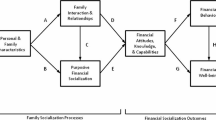Abstract
Various human groups, from food foragers to inner-city urban Americans, have used widespread sharing of resources through kin networks as a means of buffering themselves against fluctuations in resource availability in their environments. This paper addresses the effects of progressive incorporation into a wage-labor economy on the benefits of traditional kin networks for two social classes in urban South India. Predictions regarding the effects of kin network wealth, education, and size on child and spouse characteristics and methods of financing marriages are tested using various regression techniques. Despite the rapid growth of participation in a wage-labor economy, it is found that kin network characteristics still have an important impact on investment behavior among families in Bangalore in both social classes. Network wealth is found to have a positive effect on child and spouse characteristics, and large networks are found to act as significant drains on family resources. However, the results for education are broadly consistent with an interpretation of increasing family autonomy as parents’ education has a far stronger influence on child and spouse characteristics across categories than network education does. Finally, professional-class parents are found to prefer financing marriages using formal mechanisms such as savings and bank loans while working-class parents preferentially finance marriages using credit from relatives and friends.
Similar content being viewed by others
References
Becker, G. S. 1975 Human Capital, second ed. New York: Columbia University Press.
1991 A Treatise on the Family, second ed. Cambridge: Harvard University Press.
Bliege Bird, R. L., and D. W. Bird 1997 Delayed Reciprocity and Tolerated Theft: The Behavioral Ecology of Food-Sharing Strategies. Current Anthropology 38:49–78.
Boserup, E. 1970 Women’s Role in Economic Development. New York: St. Martin’s Press.
Bloch, F., and V. Rao 2002 Terror as a Bargaining Instrument: A Case Study of Dowry Violence in Rural India. American Economic Review 92:1029–1043.
Blurton Jones, N. G. 1984 A Selfish Origin for Human Food Sharing: Tolerated Theft. Ethology and Sociobiology 5:1–3.
Caldwell, J., P. Reddy, and P. Caldwell 1983 The Causes of Marriage Change in South India. Population Studies 37:343–361.
Dohan, D. 2003 The Price of Poverty: Money, Work, and Culture in the Mexican-American Barrio. Berkeley: University of California Press.
Farrer, C. 1996 Thunder Rides a Black Horse: Mescalero Apaches and the Mythic Present. Prospect Heights, Illinois: Waveland Press.
Goody, J. 1973 Production and Reproduction: A Comparative Study of the Domestic Domain. Cambridge Studies in Social Anthropology 17. Cambridge: Cambridge University Press.
Gurven, M. 2004 To Give and To Give Not: The Behavioral Ecology of Human Food Transfers. Behavior and Brain Sciences 27:543–559.
Harrell, S. 1997 Human Families. Boulder: Westview Press.
Kaplan, H. S. 1996 A Theory of Fertility and Parental Investment in Traditional and Modern Human Societies. Yearbook of Physical Anthropology 39:91–135.
Kaplan, H. S., and K. Hill 1985 Food Sharing among Ache Foragers: Tests of Explanatory Hypotheses. Current Anthropology 26:223–246.
Kaplan, H. S., and J. B. Lancaster 2000 The Evolutionary Economics and Psychology of the Demographic Transition to Low Fertility. In Human Behavior and Adaptation: An Anthropological Perspective, L. Cronk, Napoleon A. Chagnon, and W. Irons, eds. Pp. 283–322. Hawthorne, New York: Aldine de Gruyter.
Kaplan, H. S., J. B. Lancaster, J. A. Bock, and S. E. Johnson 1995 Does Observed Fertility Maximize Fitness among New Mexican Men? A Test of an Optimality Model and a New Theory of Parental Investment in the Embodied Capital of Off-spring. Human Nature 6:325–360.
Kaplan, H. S., J. B. Lancaster, W. T. Tucker, and K. G. Anderson 2002 Evolutionary Approach to Below-Replacement Fertility. American Journal of Human Biology 14:233–256.
Lewis, O. 1959 Five Families: Mexican Case Studies in the Culture of Poverty. New York: Basic Books.
1970 Anthropological Essays. New York: Random House.
Scheper-Hughes, N. 1992 Death without Weeping: The Violence of Everyday Life in Brazil. Berkeley: University of California Press.
Shenk, M. 2004 Embodied Capital and Heritable Wealth in Complex Cultures: A Class-Based Analysis of Parental Investment in Urban South India. Research in Economic Anthropology 23:303–330.
Srinivas, M. N. 1962 Caste in Modern India and Other Essays. Bombay: Asia Publishing House.
1978 The Changing Position of Indian Women. Delhi: Oxford University Press.
1984 Some Reflections on Dowry. Delhi: Oxford University Press.
Stack, C. 1974 All Our Kin: Strategies for Survival in a Black Community. New York: Harper and Row.
Trivers, R. 1972 Parental Investment and Sexual Selection. In Sexual Selection and the Descent of Man, 1871–1971, B. Campbell, ed. Pp. 136–179. Chicago: Aldine.
Visaria, P. 1993 Demographic Aspects of Development: The Indian Experience. The Indian Journal of Social Science 6:219–242.
Winterhalder, B. 1997 Gifts Given, Gifts Taken: The Behavioral Ecology of Nonmarket, Intragroup Exchange. Journal of Archaeological Research 5:121–169.
Author information
Authors and Affiliations
Corresponding author
Additional information
This research was largely funded by a National Science Foundation Dissertation Improvement Grant, Award ID No. BCS-0001523. Additional funding came from the Ruby Weitzer Morris Memorial Fellowship.
Mary K. Shenk recently completed her Ph.D. in Anthropology at the University of Washington where she is currently a Postdoctoral Fellow at the Center for Studies in Demography and Ecology supported by a three-year individual Ruth L. Kirschstein National Research Service Award from NICHD. Her theoretical interests include the evolutionary economics of marriage, parental investment, and property transmission systems, and her fieldwork focuses on the social and economic strategies of different caste and class groups in urban South India.
Rights and permissions
About this article
Cite this article
Shenk, M.K. Kin investment in wage-labor economies. Hum Nat 16, 81–113 (2005). https://doi.org/10.1007/s12110-005-1008-1
Received:
Revised:
Issue Date:
DOI: https://doi.org/10.1007/s12110-005-1008-1




